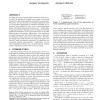234 search results - page 9 / 47 » A polynomial-time nash equilibrium algorithm for repeated ga... |
CORR
2010
Springer
14 years 11 months ago
2010
Springer
It is frequently suggested that predictions made by game theory could be improved by considering computational restrictions when modeling agents. Under the supposition that player...
102
click to vote
IPL
2010
14 years 8 months ago
2010
We introduce a game-theoretic model of diffusion of technologies, advertisements, or influence through a social network. The novelty in our model is that the players are intereste...
105
click to vote
GLOBECOM
2008
IEEE
15 years 6 months ago
2008
IEEE
— We consider the issue of fair share of the spectrum opportunity for the case of spectrum-overlay cognitive radio networks. Owing to the decentralized nature of the network, we ...
ATAL
2008
Springer
15 years 1 months ago
2008
Springer
We define the class of games called simulation-based games, in which the payoffs are available as an output of an oracle (simulator), rather than specified analytically or using a...
WINE
2009
Springer
15 years 6 months ago
2009
Springer
Recent results regarding games with congestion-averse utilities (or, congestion-averse games—CAGs) have shown they possess some very desirable properties. Specifically, they hav...

